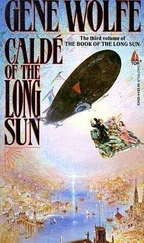Wolfe, Gene - The Best of Gene Wolfe
Здесь есть возможность читать онлайн «Wolfe, Gene - The Best of Gene Wolfe» весь текст электронной книги совершенно бесплатно (целиком полную версию без сокращений). В некоторых случаях можно слушать аудио, скачать через торрент в формате fb2 и присутствует краткое содержание. Жанр: Старинная литература, на английском языке. Описание произведения, (предисловие) а так же отзывы посетителей доступны на портале библиотеки ЛибКат.
- Название:The Best of Gene Wolfe
- Автор:
- Жанр:
- Год:неизвестен
- ISBN:нет данных
- Рейтинг книги:5 / 5. Голосов: 1
-
Избранное:Добавить в избранное
- Отзывы:
-
Ваша оценка:
- 100
- 1
- 2
- 3
- 4
- 5
The Best of Gene Wolfe: краткое содержание, описание и аннотация
Предлагаем к чтению аннотацию, описание, краткое содержание или предисловие (зависит от того, что написал сам автор книги «The Best of Gene Wolfe»). Если вы не нашли необходимую информацию о книге — напишите в комментариях, мы постараемся отыскать её.
The Best of Gene Wolfe — читать онлайн бесплатно полную книгу (весь текст) целиком
Ниже представлен текст книги, разбитый по страницам. Система сохранения места последней прочитанной страницы, позволяет с удобством читать онлайн бесплатно книгу «The Best of Gene Wolfe», без необходимости каждый раз заново искать на чём Вы остановились. Поставьте закладку, и сможете в любой момент перейти на страницу, на которой закончили чтение.
Интервал:
Закладка:
From my studies I was better informed, and I told her that they had been human as infants—in some cases even as children or older—and that they differed from normal people only as a result of surgery (some of it on their brains) and chemically induced alterations in their endocrine systems. And of course in appearance because of their scars.
“Your father does that sort of thing to little girls, doesn’t he? For your house?”
David said, “Only once in a while. It takes a lot of time, and most people prefer normals, even when they prefer pretty odd normals.”
“I’d like to see some of them. I mean the ones he’s worked on.”
I was still thinking of the fighting slaves around us and said, “Don’t you know about these things? I thought you’d been here before. You knew about the dogs.”
“Oh, I’ve seen them before, and the man told me about them. I suppose I was just thinking out loud. It would be awful if they were still people.”
Their eyes followed us, and I wondered if they could understand her.
The ground floor was very different from the ones above. The walls were paneled; there were framed pictures of dogs and cocks and of the slaves and curious animals. The windows, opening toward Egouts Street and the bay, were high and narrow and admitted only slender beams of the bright sunlight to pick out of the gloom the arm alone of a rich red-leather chair, a square of maroon carpet no bigger than a book, a half-full decanter. I took three steps into this room and knew that we had been discovered. Striding toward us was a tall, high-shouldered young man—who halted, with a startled look, just when I did. He was my own reflection in a gilt-framed pier glass, and I felt the momentary dislocation that comes when a stranger, an unrecognized shape, turns or moves his head and is some familiar friend glimpsed, perhaps for the first time, from outside. The sharp-chinned, grim-looking boy I had seen when I did not know him to be myself had been myself as Phaedria and David, Mr. Million and my aunt, saw me.
“This is where he talks to customers,” Phaedria said. “If he’s trying to sell something he has his people bring them down one at a time so you don’t see the others, but you can hear the dogs bark even from way down here, and he took Papa and me upstairs and showed us everything.”
David asked, “Did he show you where he keeps the money?”
“In back. See that tapestry? It’s really a curtain, because while Papa was talking to him, a man came who owed him for something and paid, and he went through there with it.”
The door behind the tapestry opened on a small office, with still another door in the wall opposite. There was no sign of a safe or strongbox. David broke the lock on the desk with a pry bar from his tool kit, but there was only the usual clutter of papers, and I was about to open the second door when I heard a sound, a scraping or shuffling, from the room beyond.
For a minute or more none of us moved. I stood with my hand on the latch. Phaedria, behind me and to my left, had been looking under the carpet for a cache in the floor—she remained crouched, her skirt a black pool at her feet. From somewhere near the broken desk I could hear David’s breathing. The shuffling came again, and a board creaked. David said very softly, “It’s an animal.”
I drew my fingers away from the latch and looked at him. He was still gripping the pry bar and his face was pale, but he smiled. “An animal tethered in there, shifting its feet. That’s all.”
I said, “How do you know?”
“Anybody in there would have heard us, especially when I cracked the desk. If it were a person he would have come out, or if he were afraid he’d hide and be quiet.”
Phaedria said, “I think he’s right. Open the door.”
“Before I do, if it isn’t an animal?”
David said, “It is.”
“But if it isn’t?”
I saw the answer on their faces; David gripped his pry bar, and I opened the door.
The room beyond was larger than I had expected, but bare and dirty. The only light came from a single window high in the farther wall. In the middle of the floor stood a big chest, of dark wood bound with iron, and before it lay what appeared to be a bundle of rags. As I stepped from the carpeted office the rags moved and a face, a face triangular as a mantis’s, turned toward me. Its chin was hardly more than an inch from the floor, but under deep brows the eyes were tiny scarlet fires.
“That must be it,” Phaedria said. She was looking not at the face but at the iron-banded chest. “David, can you break into that?”
“I think so,” David said, but he, like me, was watching the ragged thing’s eyes. “What about that?” he said after a moment, and gestured toward it. Before Phaedria or I could answer, its mouth opened showing long, narrow teeth, gray-yellow. “Sick,” it said.
None of us, I think, had thought it could speak. It was as though a mummy had spoken. Outside, a carriage went past, its iron wheels rattling on the cobbles.
“Let’s go,” David said. “Let’s get out.”
Phaedria said, “It’s sick. Don’t you see, the owner’s brought it down here where he can look in on it and take care of it. It’s sick.”
“And he chained his sick slave to the cash box?” David cocked an eyebrow at her.
“Don’t you see? It’s the only heavy thing in the room. All you have to do is go over there and knock the poor creature in the head. If you’re afraid, give me the bar and I’ll do it myself.”
“I’ll do it.”
I followed him to within a few feet of the chest. He gestured at the slave imperiously with the steel pry bar. “You! Move away from there.”
The slave made a gurgling sound and crawled to one side, dragging his chain. He was wrapped in a filthy, tattered blanket and seemed hardly larger than a child, though I noticed that his hands were immense.
I turned and took a step toward Phaedria, intending to urge that we leave if David were unable to open the chest in a few minutes. I remember that before I heard or felt anything I saw her eyes open wide, and I was still wondering why when David’s kit of tools clattered on the floor and David himself fell with a thud and a little gasp. Phaedria screamed, and all the dogs on the third floor began to bark.
All this, of course, took less than a second. I turned to look almost as David fell. The slave had darted out an arm and caught my brother by the ankle, and then in an instant had thrown off his blanket and bounded—that is the only way to describe it—on top of him.
I caught him by the neck and jerked him backward, thinking that he would cling to David and that it would be necessary to tear him away, but the instant he felt my hands he flung David aside and writhed like a spider in my grip. He had four arms .
I saw them flailing as he tried to reach me, and I let go of him and jerked back, as if a rat had been thrust at my face. That instinctive repulsion saved me; he drove his feet backward in a kick which, if I had still been holding him tightly enough to give him a fulcrum, would have surely ruptured my liver or spleen and killed me.
Instead it shot him forward and me, gasping for breath, back. I fell and rolled, and was outside the circle permitted him by his chain; David had already scrambled away, and Phaedria was well out of his reach.
For a moment, while I shuddered and tried to sit up, the three of us simply stared at him. Then David quoted wryly:
Arms and the man I sing, who forc’d by fate,
And haughty Juno’s unrelenting hate,
Expell’d and exil’d, left the Trojan shore.
Neither Phaedria nor I laughed, but Phaedria let out her breath in a long sigh and asked me, “How did they do that? Get him like that?”
Читать дальшеИнтервал:
Закладка:
Похожие книги на «The Best of Gene Wolfe»
Представляем Вашему вниманию похожие книги на «The Best of Gene Wolfe» списком для выбора. Мы отобрали схожую по названию и смыслу литературу в надежде предоставить читателям больше вариантов отыскать новые, интересные, ещё непрочитанные произведения.
Обсуждение, отзывы о книге «The Best of Gene Wolfe» и просто собственные мнения читателей. Оставьте ваши комментарии, напишите, что Вы думаете о произведении, его смысле или главных героях. Укажите что конкретно понравилось, а что нет, и почему Вы так считаете.









